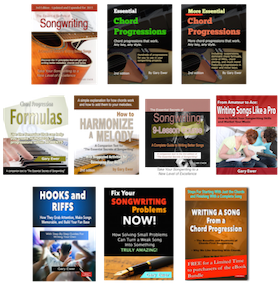 No songwriter should tolerate mediocrity. It will amaze you how quickly a weak song can be turned into something that really grabs attention. “The Essential Secrets of Songwriting” eBook Bundle packages will show you how. Get a DISCOUNT right now.
No songwriter should tolerate mediocrity. It will amaze you how quickly a weak song can be turned into something that really grabs attention. “The Essential Secrets of Songwriting” eBook Bundle packages will show you how. Get a DISCOUNT right now.
______________
 When we define songwriting success, the actual number of songs someone has written doesn’t much figure into the equation. You may have written hundreds of songs, but if no one is singing them, buying them or otherwise enjoying them, it may not matter.
When we define songwriting success, the actual number of songs someone has written doesn’t much figure into the equation. You may have written hundreds of songs, but if no one is singing them, buying them or otherwise enjoying them, it may not matter.
I say may not matter, because there is something to be said for being able to write lots of music:
- Like a baseball player getting lots of at-bats, your chances of hitting a home run increase the more you get to swing the bat. For songwriters, your chances of writing something significant increase with every song you write.
- It’s hard to build an audience base for your music if you’ve only written five songs — even if those five songs are wonderful.
- Every time you write a song, you learn something new about your creative process, and that improves your technique.
In order of importance, you want to:
- Improve your songwriting technique.
- Increase your songwriting output.
Addressing step 1 is easy — relatively, anyway. You should do what you’re probably already doing, which is reading what others are saying about songwriting, as well as playing your music for good songwriters and getting good advice. Analyze the songs you love and try to figure out why they work so well. Don’t be afraid to be influenced by others.
For step 2, it’s difficult if you’re the kind of writer who only writes when feeling inspired. Increasing your output means being able to write when you don’t feel like it, and yes, that’s possible to do. And in fact, if you want to be anything close to prolific, it’s essential.
An increased songwriting output is going to happen if you:
- Schedule your songwriting activities. Don’t leave it up to chance, or do it because you’ve got nothing else to do. Treat it like a job, even if it’s a job you only do for an hour or so per day.
- Schedule some downtime before your songwriting activities. Take a 15-30 minute break before you try songwriting. That break should be a time when you can relax quietly, not in a noisy room or conversing with others. Research shows that getting quiet before getting creative is extremely beneficial.
- Set real songwriting targets, with real consequences for missing those targets. There’s a funny quote by author Mavis Cheek: “Authors with a mortgage never get writer’s block,” and the same should apply to songwriters. Set a real target for yourself to complete a song by setting a date for completion, and then imagine an audience waiting for that song.
Research shows that it really does work to “force yourself” to write. Writing only when you feel like it is just too random for anyone trying to make it in the music business.
Having said that, there is also something to be said for stepping back and taking a break every once in a while. Getting your mind on something else other than songwriting every once in a while can be a good thing. It gets the creative juices flowing again.
Save everything you start. If you get stuck, file it away, and start something new. On those days when ideas are hard to come by, you can then turn back to songs you started but never finished. It’s amazing how many times ideas will suddenly start to flow when you look at an old incomplete song.
______________
 Written by Gary Ewer. Follow on Twitter.
Written by Gary Ewer. Follow on Twitter.
 “The Essential Secrets of Songwriting” eBook Bundle packages look at songwriting from every angle, and have been used by thousands of songwriters. How to use chords, write melodies, and craft winning lyrics. GET THIS DEAL
“The Essential Secrets of Songwriting” eBook Bundle packages look at songwriting from every angle, and have been used by thousands of songwriters. How to use chords, write melodies, and craft winning lyrics. GET THIS DEAL










Reblogged this on I Write The Music.